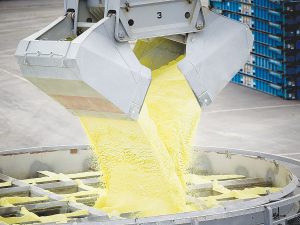Geopolitical shifts drive fertiliser market volatility – Ravensdown
According to Ravensdown's most recent Market Outlook report, a combination of geopolitical movements and volatile market responses are impacting the global fertiliser landscape.
 Global fertiliser prices are expected to settle in 2024, despite uncertainty posed by the Israel-Hamas conflict.
Global fertiliser prices are expected to settle in 2024, despite uncertainty posed by the Israel-Hamas conflict.
After extreme market volatility and record-high prices in recent years, global fertiliser prices are expected to settle in 2024, despite uncertainty posed by the Israel-Hamas conflict as it currently stands.
That’s according to agri-banking specialist Rabobank’s just-released Semi Annual Fertiliser Outlook, titled What is Next? In it, Rabobank says while escalating tensions in the Middle East create some uncertainty in the outlook for fertiliser markets, the current impact for the food and agri sectors is manageable.
Report co-author, RaboResearch farm inputs analyst Vitor Pistoia says that, overall, farmers around the world may feel some negative impact due to potentially rising costs of energy and fertilisers. He adds this comes on top of slightly lower import demand and prices for grains and oilseeds due to the Israel- Hamas conflict.
However, Pistoia warns if the conflict spreads to the broader Middle East/North African (MENA) region, impacts on fertiliser supply – as well as grain, meat, and dairy demand – could be notable.
“If the conflict escalates to surrounding countries and one of these countries is Iran, and we have proper military movement from Iran versus Western countries, it can drive crude oil up to 160 USD (90.07 USD as of October 30th),” he told Rural News.
“Iran controls the Strait of Hormuz and if there is an escalation they will very likely close the strait so that can impact the surrounding countries i.e. Iraq, Saudi Arabia – that’s a large part of the oil supply.”
Israel exports 6% of the world’s potash and 8% of its phosphate fertilisers (2022 data), while the broader MENA region accounts for 30% of the world’s nitrogen fertiliser exports.
The region also accounts for more than 25% of global mixed fertiliser exports, 10% of potassic fertilisers and almost half of the phosphatic fertiliser exports. It remains to be seen how much of those trade volumes will be impacted in the coming months.
Pistoia says while 2024 is still some months away, this year has been a much calmer year for the fertiliser market and can be seen as a transition year, even with some remnants of all the market complications from 2022.
The bank’s models indicate a recovery in global fertiliser usage in 2023, up by around 3%, compared to the 7% drop in 2022, with an initial analysis suggesting an increase in global fertiliser use of close to 5% in 2024.
Pistoia said local fertiliser prices were significantly lower than a year ago, but this would not necessarily lead to increased fertiliser usage across New Zealand farms over coming months.
“Farm margins are incredibly tight across the majority of New Zealand farming businesses due to lower commodity prices and ongoing elevated costs for other farm inputs – like fuel and feed – as well as higher interest costs,” he adds.
“And a key question is how much the recent drop in the New Zealand dollar will offset the reduced cost of fertiliser in farmers’ budgets. When this lower dollar is combined with the recent crude oil hikes, how much is left in those budgets to increase fertiliser application rates?”
According to the latest Fresh Produce Trend Report from United Fresh, 2026 will be a year where fruit and vegetables are shaped by cost pressures, rapid digital adoption, and a renewed focus on wellbeing at home.
The Roar is a highlight of the game hunting calendar in New Zealand, with thousands of hunters set to head for the hills to hunt male stags during March and April.
OPINION: The past few weeks have been tough on farms across the North Island: floods and storms have caused damage and disruption to families and businesses.
European dairy giant Arla Foods celebrated its 25th anniversary as a cross-border, farmer-owned co-operative with a solid half-year result.
The sale of Fonterra’s global consumer and related businesses is expected to be completed within two months.
Fonterra is boosting its butter production capacity to meet growing demand.

OPINION: Meanwhile, red blooded Northland politician Matua Shane Jones has provided one of the most telling quotes of the year…
OPINION: This old mutt has been around for a few years now and it seems these ‘once in 100-year’ weather…